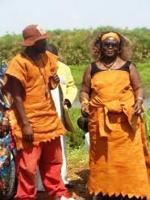Tanzania Dar es Salaam Shopping Guide
These are my Dar es Salaam Shopping Tips, what to buy in Dar es Salaam , where to buy best handcrafts in Dar es salaam and how to haggle on price.
You will find a great variety of Hand-carved wooden sculptures and carvings with more traditional themes in the markets of Tanzania. Even in the Open Markets you will find them.
You can bargain if you enjoy bargaining. Here a bargain is a must.Specific areas around the country are particularly renowned for their craftsmanship, and craft centres, artist cooperatives, and good gift shops should have a selection of carvings, paintings, baskets, and jewellery from all over Tanzania.
Bargaining is advisable in smaller shops and cooperatives, where the artists usually gain a significant percentage of the proceeds.
In larger shops and hotels, prices will be higher and bargaining is usually not allowed.
As you travel, you will often see people selling curios on the street – Masaai women hawking necklaces at petrol stations, children selling bracelets outside a popular restaurant, or a batik seller walking the city streets in search of customers.
Foreign currency is often accepted in larger shops around the country.
How do you know if you’re paying too much or if the goods you’re buying are really authentic?
Check basket weaves for quality and woodcarvings for signs of shoe polish and cracks, but ultimately if you’re happy with your purchase, you’ve made the right decision.
Regional specialities and unique finds include Masaai beadwork, gourds and spears from northern Tanzania, and Makonde woodcarvings of people and wildlife.
Woven mkeka mats make good floor coverings – the plain, straw-coloured kind are woven from sisal by craftsmen in Karatu, near the Crater Highlands.
On the coast, the women of Mafia Island are particularly renowned for their colourful mkeka weaving and incorporate colours and designs (among them ‘gecko’s backbone’, ‘the Arab’s scarf’, and ‘popcorn’) into the mats they make from dried and twisted palm fronds.
Baskets often make great storage places for magazines and newspapers back at home and often double as handbags – the best come from Singida, and most craft shops in Dar es Salaam and Arusha will carry them. In Zanzibar, old tiles, bowls, and carved wooden chests make fantastic souvenirs of your journey to the coast.
Aside from regional specialties, there are a variety of smaller local items that make great presents and take-home souvenirs.
Bright printed clothes called kangas are worn by women all over Tanzania. They’re sold in pairs and emblazoned with a witticism or traditional proverb.
Kangas go in and out of style – look around and you’ll see this season’s fashions on women from Dar es Salaam to the shores of Lake Victoria.
Kikois are similar in shape and size to kangas, but are traditionally worn by the men of the Swahili coast as wrap-around sarongs.
Woven with vertical stripes, kikois make popular gifts and are simpler and more demure than the bright colours and prints of women’s kangas.
If you’re looking for special food or delicacies of Tanzania, pick up bags of Zanzibar spices direct from the market – vanilla beans fresh off the tree, bags of whole cloves and round nutmegs laced with mace make great gifts for cooks back home. Honey direct from Tabora in central Tanzania is also a special delicacy.
Dar es Salaam Shopping Streets
Boutiques selling tanzanite and silver jewellery fill the big shopping centres around Msasani Peninsula; the Mwenge crafts market is best for wood carvings. For an authentically Tanzanian shopping experience, browse through the bazaars and stalls in the town centre around Posta Street.
Dar es Salaam Shopping Markets
Dar es Salaam's markets are an exhilarating experience. Kariakoo is the mother of all markets – from traditional fabrics to spare car parts, it's all here. The Mwenge crafts market is a great place to pick up wooden carvings by the Makonde tribe, or try the open air market at The Slipway for beaded flip-flops, jewellery and ornaments.
Dar es Salaam Shopping Tips
Do not be afraid of haggling but be aware more upmarket shops usually stick to the labelled price. Opening times can be erratic – local markets open early in the morning and close at dusk, and shops tend to tradebetween around 10am and 5pm.
Dar es Salaam Shopping hours
Mon-Fri 0830-1200 and 1400-1800, Sat 0830-1230. Some shops open on Sunday.
Banking hours
Mon-Fri 0830-1230 (some places are open until 1600), Sat 0830-1300.
Dar es Salaam Shopping and Currency
Tanzanian Shilling (TZS) = 100 cents. Notes are in denominations of TZS10,000, 5000, 2000, 1000 and 500. Coins are in denominations of TZS200, 100, 50, 20, 10, 5 and 1, and 50, 10 and 5 cents.
Currency exchange
Money may be changed at banks, authorized dealers and bureaux de change. A receipt should be obtained and kept until departure.
Credit & debit cards
Major credit cards are accepted in larger hotels. Check with your credit ordebit card company for details of merchant acceptability and other facilities which may be available. Cash can be withdrawn from some ATMs using Visa or Mastercard.
Traveller's cheques
May be cashed with authorized dealers or bureaux de change. To avoid additional exchange rate charges, travellers are advised to take traveller's cheques in US Dollars or Pounds Sterling.
Dar es Salaam Shopping and Currency restrictions
The import and export of local currency is prohibited. The import of foreign currency is unlimited, subject to declaration. The export of foreign currency is limited to the amount declared on arrival.
Back to Cities in Kenya East Africa
From Tanzania Dar es Salaam Shopping Guide Back to Vacation Tips Home Page
Recent Articles
-
Garam Masala Appetizers ,How to Make Garam Masala,Kenya Cuisines
Sep 21, 14 03:38 PM
Garam Masala Appetizers are originally Indian food but of recent, many Kenyans use it. Therefore, on this site, we will guide you on how to make it easily. -
The Details of the Baruuli-Banyara People and their Culture in Uganda
Sep 03, 14 12:32 AM
The Baruuli-Banyala are a people of Central Uganda who generally live near the Nile River-Lake Kyoga basin. -
Guide to Nubi People and their Culture in Kenya and Uganda
Sep 03, 14 12:24 AM
The Nubians consist of seven non-Arab Muslim tribes which originated in the Nubia region, an area between Aswan in southern







New! Comments
Have your say about what you just read! Leave me a comment in the box below.